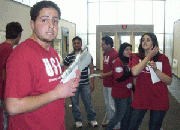DEARBORN — A group of Arab American students at the University of Michigan-Dearborn have raised complaints of discrimination after a student government election left them feeling excluded and ignored by university administrators.

|
|
University of Michigan-Dearborn students campaign during student government elections on April 23. Rashid Baydoun, left, was elected a senator. Sarah Jaward, right, was elected vice presedent. Leila Anani, center right, was not allowed on the ballot, along with 17 other senate candidates — most of them Arab Americans, for reasons the students dispute. Photos couresy of Leila Anani |
UM-D spokesman Terry Gallagher insists that the university takes pride in the energetic activities of its diverse student body, calling it a sign of the campus’ vitality, and denies that there is an effort among administrators to hinder the political activity of Arab American students.
“I don’t think there’s any kind of campaign like that,” he said. “We’re really pleased that we have an active student body.”
Buzz over a long list of complaints spread beyond the campus and into the Arab American community when tensions came to a head during student government elections last month and the grievances were reported to the American-Arab Anti-Discrimination Committee.
“I think there’s a great record of engagement with the Arab American community,” said Gallagher in denying any tensions.
Ahead of the student government elections, held on April 22 and 23, new rules were passed by the student body requiring candidates for student senate to gather 100 signatures supporting their bid to be placed on the election ballot.

|
|
Samer Hijazi, a UM-D student whose name was not included on student government election ballots because signatures on his petitions were deemed invalid, campaigns for the University Student Advocates slate on April 23. |
Hussein Berry, a senior majoring in biology and philosophy, submitted 111 signatures. Eleven were deemed invalid, leaving him one signature shy of getting his name on the ballot.
Berry said he appealed the denial, confirming for officials the signature and student ID number of at least one student whose signature had been rejected.
He said administrators initially told him it would be corrected, then ignored his complaints and refused to place his name on the ballot.
Berry and Rashid Baydoun, a communications and psychology student who made the ballot and was elected to the senate, said several other students were denied places on the ballot because of signatures they believe were rejected arbitrarily.
The two belong to the student political party University Student Activists (USA), which is comprised mostly of members of the Arab Student Union and a smaller group of African American students.
Sixteen of the 18 students who were denied spots on the ballot were USA candidates.
Gallagher said that a thorough process for reviewing the election is in place and that all complaints on the election have been resolved.
“They might not be happy, but we’ve already reviewed those complaints,” he said. “There are no outstanding complaints to the election process… We’re very confident that we’ve been very fair about this.”
The eight USA senate candidates who did make the ballot, along with the party’s presidential and vice presidential candidates, won their seats by a wide margin. With no other USA names on the ballot, 16 members of the opposing Maize and Blue party took the remaining seats. An additional six Maize and Blue candidates were then added to the senate to remedy what administrators described as a glitch in the vote counting system.
While the Maize and Blue slate did include some Arab Americans, the party, according to campus newspaper The Michigan Journal, is less likely than USA to challenge the university on issues like course registration fees, health coverage costs and other student concerns.
“They don’t want anybody challenging the system,” said Berry. “They know that people with our slate are going to challenge the system.”
He and Baydoun said they frequently sense a general condescending tone from the university toward Arab Student Union activity, and that stated intentions of the USA party to push for tuition assessments, tuition payment policy reviews, hardship programs, better career services programs, and other measures, sparked further animosity toward the group from administrators.
“The administration doesn’t want us in,” Baydoun said. “We couldn’t even have a fair election. The administration already had their eyebrows raised at us.”
Gallagher strongly denied any hostility on the part of the university toward any student activity, and said the election process, even when students struggle with it, is intended to be a learning experience for the students.
“We think the student government is a learning experience, and running for student government is part of that opportunity,” he said.
The students feel their complaints have been brushed aside.
“They’ve completely disregarded our concerns,” said Berry. “They throw away our complaints… It’s beyond anything I’ve ever seen.”
He said that during his interactions with administrators leading up to the election, he felt discriminated against for the first time in his life.
“I used to go to Central Michigan [University]. I never had a problem there with anything,” he said.
Aside from the students’ frustrations with the election, the Arab Student Union is also currently banned from reserving space in the main activity rooms of the University Center, for the official reason that the group recently brought sandwiches to an event.






Leave a Reply